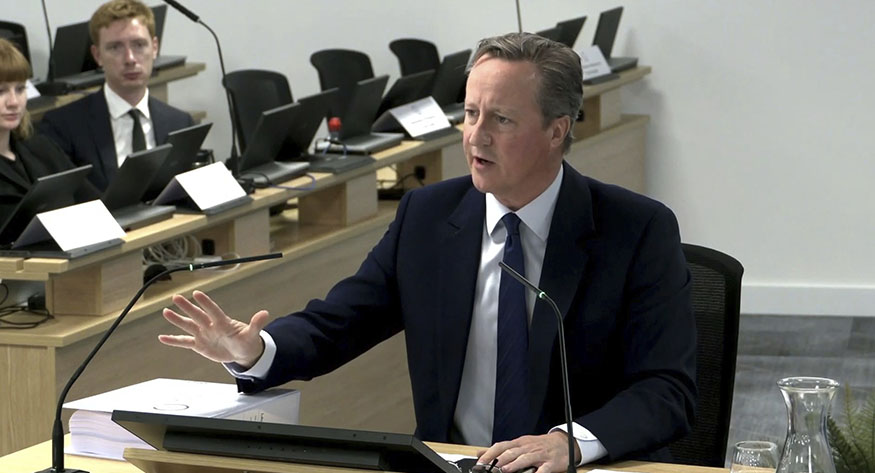One of the main criticisms about public inquiries is that they produce a need for blame and scapegoats, rather than a thorough understanding of the facts about complex problems.
The second week of the UK Covid inquiry focused heavily on the lack of pandemic preparedness, the consequences of austerity policies and the perils of groupthink in the UK civil service bureaucracy.
The former Chief Medical Officer, Sally Davies, and former Prime Minister, David Cameron, both claimed that a pandemic influenza “groupthink” had taken over emergency planning and blinded experts to the unique threat of Covid. The country had prepared for the wrong pandemic.
George Osborne, Chancellor of the Exchequer under the Cameron government, stated that: “no one…anywhere in the Western World or anywhere in the world said…governments should prepare for a coronavirus pandemic that will require us to lockdown the entire economy for months on end.”
But these ideas risk perpetuating a false narrative about Covid exceptionalism that must be questioned.
First, the idea that pandemic influenza plans were not sufficiently fit-for-purpose for Covid is wrong. Of course, every pathogen has unique attributes but, in general, the WHO guidelines for non-pharmaceutical interventions produced in late 2019 provided a solid base to respond. Likewise, the updated Cochrane review on community masking (which showed little effect) pooled studies from influenza and Covid for good methodological reasons. Government estimates from 2017 show upwards of 750,000 excess deaths could occur during an influenza pandemic in the UK. Current official data suggest 227,000 deaths from Covid since 2020.
Second, the idea that lockdowns were not considered because of ‘influenza groupthink’ sidesteps the political origins of the policy. On Tuesday, Osborne repeated the obvious point that has now become a more acceptable opinion: “I think the Chinese lockdown [gave] the rest of the world the idea of a lockdown.” The scientific advice prior to the infamous Ferguson model was to reject or delay lockdown. In fact, Neil Ferguson himself acknowledged this: “If China had not done it…the year would have been very different.”
On Thursday, the current Chief Medical Officer, Chris Whitty, told the inquiry that the government needed more “radicalism” in its health emergency response; the ‘leap of imagination’ of lockdown would not have occurred if only they had prepared for it.
Recently, a series of articles, mostly in Left-leaning outlets, have bemoaned efforts to question this narrative as a form of lockdown revisionism, but these claims are decidedly obtuse and incorrect.
Lockdowns were outside the bounds of possibility because they were considered to be antithetical to certain Western political and social values in times of calm thinking. This is embodied in the term itself: since the 1970s, a “lockdown” has meant the forced confinement of prison inmates and psychiatric patients, and more recently in the United States, active shooter situations (e.g. in schools). That Britain copied the Chinese Communist Party’s new lockdown “radicalism” is uncomfortable to say out loud.
Third, the absence of lockdown recommendations in pandemic influenza plans also accounted for their harms. The goal was to disrupt the normal functioning of society
to the least possible degree. And yet, just a few months ago, Rishi Sunak, the current Prime Minister, stated that: “I wasn’t allowed to talk about trade-offs…the script was not to ever acknowledge them. The script was: oh, there’s no trade-off.”
Sally Davies implicitly acknowledged these trade-offs on Tuesdays when she said that lockdown had “damaged a generation”. And yet, she then went on to say that “I still think we should have locked down, although a week earlier.” This seems to now be the consensus position.
Fourth, it is imperative that the inquiry takes a more sceptical approach to the effectiveness of lockdown on disease epidemiology. Both Chris Whitty and Patrick Vallence, the former Chief Scientific Advisor, who spoke this week to the inquiry were also witnesses to a major 2021 parliamentary Covid report that was roughly in line with the positions they took this week: faster lockdown.
A consensus about lockdown “radicalism” (to use Whitty’s term) was created in the stress of the moment. But it quickly ascended to the status of a regime of truth. Yes, many consensus positions, including a December 2022 technical report written by Whitty and Vallence, continue to state that “lockdowns work” but other work seriously calls this into question.
The pandemic influenza blame game may be a convenient narrative, but it does not easily fit the facts.










Join the discussion
Join like minded readers that support our journalism by becoming a paid subscriber
To join the discussion in the comments, become a paid subscriber.
Join like minded readers that support our journalism, read unlimited articles and enjoy other subscriber-only benefits.
Subscribe